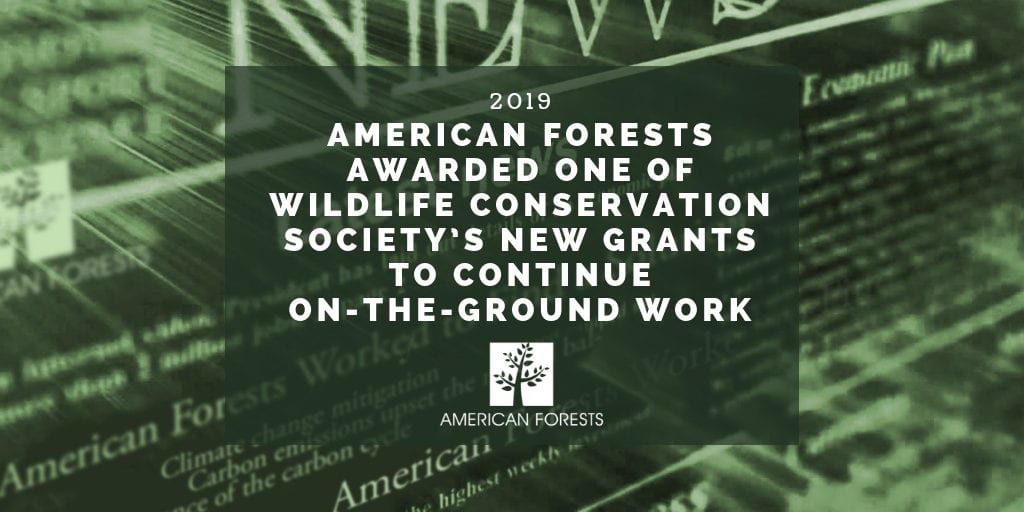
American Forests Awarded One of Wildlife Conservation Society’s New Grants to Continue
On-The-Ground Work
Conservation group American Forests receives a grant to help forest habitats in the Lower Rio Grande Valley of Texas adapt to climate change.
Washington, D.C. (February 13, 2019) – American Forests, the oldest national conservation group founded in 1875, has been awarded new funding to advance climate-resilient restoration in the Lower Rio Grande Valley of Texas through the Wildlife Conservation Society’s Climate Adaptation Fund. This fund is made possible by support from the Doris Duke Charitable Foundation.
The Lower Rio Grande Valley (LRGV) in South Texas is one of North America’s most important biodiversity hotspots. The local Tamaulipan (Texas) thornscrub forests and other habitats support a stunning array of wildlife species, including 11 that are federally listed as threatened or endangered.
American Forests has worked in the Lower Rio Grande Valley for 22 consecutive years and has planted more than 2 million thornscrub trees across over 4,000 acres of this landscape. Through this new effort, American Forests will partner with the U.S. Fish and Wildlife Service’s South Texas Refuge Complex to build a drought resilience strategy for restoration actions that will help thornscrub forests withstand the Valley’s changing climate. Creating climate-resilient forests will facilitate adaptation of the area’s rich biodiversity while also capturing and storing carbon in the restored forests.
The climate adaptation techniques to be developed will include planting a diversity of species, shifting species selection to favor drought-tolerant species, using tree shelters to retain soil moisture better, and planting in locations that will serve as corridors for migrating wildlife species.
Specifically, the new grant will enable American Forests to restore 270 acres throughout the refuge system, including planting nearly 300,000 drought tolerant trees, removing invasive species, and implementing strategies that will help local thornscrub better adapt to rising temperatures and prolonged drought.
Restoring forests to be resilient to climate change will naturally capture and store carbon—the trees planted in this project will result in 100,000 tons of carbon stored over 50 years.
“Forests need help adapting to climate change if we want them to continue providing habitat and natural carbon capture,” said Jad Daley, American Forests President and CEO. “We are very grateful to the Wildlife Conservation Society and Doris Duke Charitable Foundation for enabling American Forests to innovate new ways to replant climate-resilient thornscrub forests so we can sustain their priceless habitat and climate benefits into the future.”
This new effort is part of a sustained commitment from American Forests to restore thornscrub forest in the Valley. American Forests is developing a new recovery plan for the Valley’s forests and has catalyzed the creation of a new Thornscrub Conservation Partnership. American Forests is also supporting national and regional policies that accelerate restoration in the Valley and will continue to communicate the importance of restoration and our lessons learned.
More information can be found here: https://www.americanforests.org/our-work/american-releaf/lower-rio-grande-valley/
###
ABOUT AMERICAN FORESTS
American Forests inspires and advances the conservation of forests, which are essential to life. We do this by protecting and restoring threatened forest ecosystems, promoting and expanding urban forests, and increasing understanding of the importance of forests. Founded in 1875, American Forests is the oldest national nonprofit conservation organization in the country and has served as a catalyst for many key milestones in the conservation movement, including the founding of the U.S. Forest Service, the National Forest System, establishment of the Civilian Conservation Corps, and thousands of forest ecosystem restoration projects and public education efforts.
MEDIA CONTACT
Michael Woestehoff | Director of Communications | 202-507-3043 (direct) | mwoestehoff@americanforests.org